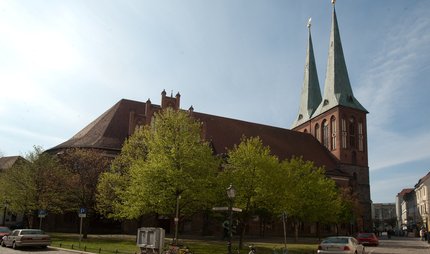
Alte Pfarrkirche Mahlsdorf
Uralt und quietschlebendig
Built around the year 1250, the small stone church in Mahlsdorf is almost as old as the city of Berlin. The beautiful baroque altar dates back to 1710. The small sandstone relief with the arms of the Diestelmeyer family is older. Under Elector Joachim II, Lampert Diestelmeyer was chancellor of the Mark Brandenburg and lord of the Mahlsdorf manor. The little pulpit with the pelican on the sounding board tearing open its own chest to bring the dead boy back to life also dates to the same era. The congregation worships here every Sunday at 10:30, accompanied by music played on a one-of-a-kind organ by Schuke, a company founded in Potsdam in 1820. The congregation’s cantor is very committed to music and hosts concerts in the church every third Sunday of the month from March to October. The concerts usually start at 5:00 pm. The field stone church situated in the tranquil churchyard in the heart of the old village of Mahlsdorf is small, so most of the concerts are of chamber music. Admission is free, but donations are taken as you leave to help support the continued existence of the concert series.
The Orthodox congregation was founded in 1869 and was able to acquire its own piece of land on what is Wittlicher Straße in Weißensee, which was far outside the city limits at the time. As the Prussian state expanded into areas with mixed religious affiliations, it eventually allowed people to opt out of automatic membership in the local congregation. The law adopted for the Jewish community on 28 July 1876 meant that members of Adass Yisroel, having opted out of the main Jewish congregation, were no longer allowed to bury their dead in the latter’s cemetery. Abraham Michelson was the first person to be buried in its new cemetery on 24 February 1880. About 3,000 others were buried here until the site was destroyed during the Nazi period. The last burial was the congregation’s Torah scrolls that had been profaned. In the years after the Second World War the cemetery fell into disrepair. It was only in second half of the 1980s when a Jewish congregations began to reform in what was still Communist East Berlin that volunteers repaired it and saved it from further decay. The cemetery is closed to the public. Visits can be arranged, however, with the Berlin-Mitte cemetery administration department.



